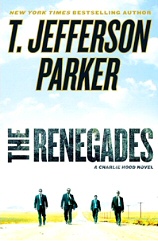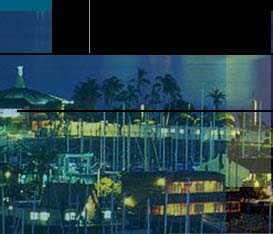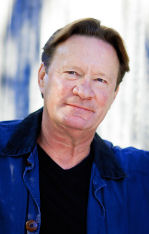
   

 




















|
|
|
 |
| US |
Hood got
partnered up with Terry Laws that night, another swing shift in the desert,
another hundred-and-fifty miles of motion on asphalt, another Crown Victoria Law
Enforcement Interceptor that would feel like home.
They walked to the motor yard without talking. Hood was
tall and lanky and Laws had a weightlifter's body that made his jacket tight
across his shoulders. Various sections of the lot were marked by signs bearing
the names of fallen deputies, and there were other sections still unnamed.
He logged the mileage and checked the tires for
pressure and wear while Terry checked the fluid levels. The Los Angeles
Sheriff's Department patrol fleet was old and worn, so they had to check even
the obvious. Two days ago the LASD Lancaster station had lost another prowl car
engine, over 260K miles on it, finally succumbing just half a mile short of the
yard with a clanging metallic death rattle. The deputy had pushed it to the curb
and called a tow.
Hood drove. He bounced the car from the yard onto the
boulevard and he felt the comforting sense of motion that connected him with
last night's motion, which connected him with the motion of the night before,
and of week and the months before that. Motion ruled. He believed that it might
lead him to what he was looking for. It had to do with a woman who had died, and
a piece of something in him, perhaps soul, that had gone missing.
It was windy and getting dark, and the desert cold was sharp and weightless as a
razor blade. A tumbleweed skipped across Avenue J. The overhead traffic light at
Division Street shivered on its cables. Snow was coming and Hood had not yet
seen snow in this desert.
He drove and watched and listened as Terry talked about
his young daughters -- basketball players, good students. Terry's friends called
him Mr. Wonderful because he was two-time L.A. Sheriff's Department bodybuilding
champion, a devoted father, and a Toys for Tots warrior each Christmas season.
He had a heroic chin and an open face and a quick smile. He'd made a
high-profile arrest on a double-homicide almost two years back, which gave him
good mojo in the department. He was thirty nine -- ten years older than Hood.
Hood had patrolled with Laws before and had thought that something was eating
the big man, but Hood believed there is something eating most of us.
They drove north on Division, east on Avenue I past the
fairgrounds. Tuesday nights in winter are slow.
Hood's world was the Antelope Valley, north of L.A. The
valley is the new frontier, the final part of the county to be heavily
developed. It is high desert, ferociously hot and cold, and dry. The cities are
booming but not quite prosperous. Thousands of the homes are new. They're
affordable. The cities have nice names, like Palmdale and Rosamond and
Pearblossom and Quartz Hill. There were no antelope in the Antelope Valley until
the 20th century, when some were released so the valley could live up to its
name, a California thing, to dream big and fill in the details later. Beyond the
Antelope Valley is the vast Mojave Desert.
"What do you make of AV after six months?" asked Laws.
"I like that you can see so far."
"Yeah, you get the wide open spaces. It's not for
everybody. You'll like the snow."
Antelope Valley was in fact the Siberia of the
Sheriff's Department, but Hood had asked to be transferred here after some
trouble in L.A. He wanted to forget and not be seen. He had been a
Bulldog-in-training -- LASD Homicide -- for about four weeks but it didn't work
out. Then, he had talked to Internal Affairs about a superior he mistook for an
honest man, and who was soon to stand trial for eight felonies. Hood would be
called as a witness by the prosecution, which he dreaded.
They got coffee and continued out Avenue I, made the
loop around Eastside Park. On the western horizon the last yellow strip of day
flattened under the black weight of night. Hood looked out at the new walled
neighborhoods stretching for miles, tract upon tract, houses huddled
roof-to-roof like they were trying to beat the cold. Hood had thought that he
would like Siberia and he did. He was a Bakersfield boy, used to open land, heat
and wind, fast cars and good music.
"I hate these Housing Authority raids," said Terry.
"They make me feel like a hired thug."
"Me, too," said Hood. At roll call they'd been told to
expect an early shift assignment to assist L.A. County Housing Authority at The
Legacy in east Lancaster. The Legacy was Section 8, federally subsidized
housing. When the owners had a problem with tenants they went to the Housing
Authority, but HA officials had no real authority at all -- they were not armed,
could not make arrests or serve warrants. Tenants were not even required to
allow them into their home. But HA could request assistance from LASD deputies,
and fear opens doors. The deputies resented these assignments, which played out
by class and race: the owners and renters, the landed and the poor, white and
black.
Dispatch called a drunk and disorderly out at the Orbit
Lounge and a west side cruiser rolled on it. Hood had quickly learned that the
AV is flight country -- from Edwards Air Force Base and Yeager and the Right
Stuff to the Stealth Skunkworks to the huge commercial aircraft plants that once
flourished here. He knew that most of that work is done elsewhere now, but the
bars still had names like the Orbit or the Firing Range or the Barrier.
"I feel action on tap tonight, Charlie. That's good. You know Mouse Washington?
You seen him? Big, Eight Tray Crip, built like a Hummer? Lives with his mom and
a bunch of pitbulls in a Section eight? He beat the piss out of two Bloods right
outside the mall yesterday. Two of his dogs held them, deep puncture wounds all
up and down their legs. One of em's still in the hospital."
Hood, in his six short months up here in the desert,
had seen that the gangs were thriving. There had been another killing just last
week, a seventeen year-old clicked up with 18th, standing on a street corner
waving a big foam "New Homes" sign shaped like an arrow. Hood had learned that
these people were called "human directionals" by the developers who hired them,
but most people just called them just sign wavers. He'd also noted that some of
them got really good at it -- twirls and aerials and behind-the-back NBA stuff.
They could entertain you at a stoplight. But when the Blood gun car had passed
by, the human directional with the "New Homes" sign had six bullets in him and
he died later in a hospital.
"Speaking of dog bites," said Laws. He unbuttoned his
long-sleeved uniform shirt and showed Hood his left forearm, discolored and
punctured, but healing. "That's what I got for helping a guy out." He turned on
the dome light for a moment and looked at the wound as if it was a mystery he
hadn't yet solved.
"Dog have shots?"
"Yeah. Don't worry, I'm not going rabid on you."
They pulled into the Legacy housing development. Big
homes, two stories, with peaked roofs with dormers and faux shutters on the
windows. The tract was ten years old and some of the houses already looked like
they should be condemned. The desert ages buildings and people twice as fast as
anywhere else.
Fourteen-eleven Storybook had a dead brown lawn, weeds
eating through the driveway concrete and a broken window patched with plywood
against the cold. There were signs of effort, too: a couple of shiny kids' bikes
up by the porch and a bird feeder swinging from a lemon tree in the middle of
the dead grass, and a bed of wind-lashed rose bushes by the garage.
A Housing Authority van was parked in the driveway, two
men standing by the driver's door. Hood and Laws pulled up to the curb opposite
and parked just short of a pepper tree thrashing in the wind. Hood heard the
crunch and rattle of peppercorns when he stepped out of the car and crossed the
street.
The Housing Authority investigators were Strummer and
Fernandez, both mid-forties, both wearing jeans and athletic shoes, Los Angeles
County Housing Authority windbreakers and baseball caps. Strummer had lank blond
hair and a long nose. Fernandez, who held a clipboard, was slope-shouldered and
short.
Strummer explained that they'd heard complaints of
marijuana use and loud music, and rumors that the boys living here had broken
into a neighboring home, stolen a flat screen plasma HDTV, and put the family's
Chihuahua in the freezer before they left. The dog was almost dead when the
family found it but it had survived. Nobody had filed a complaint with the
Sheriff Department.
"Single mom, Jacquilla Roberts," said Strummer. "Sons
sixteen and eighteen, down with the Southside Crips. Two young ones. She's got a
boyfriend, of course -- a Lynwood felon who smelled the easy pickings up here in
the desert. He's not supposed to live here but he mostly does. Fine citizens
all."
"We'll see what we see," said Hood.
He and Laws followed the investigators up the walk. The
porch light was on.
"If you guys draw some iron we've got a better chance
of being invited in," said Strummer.
"Draw your own iron," said Laws.
"Would if I could."
"That's exactly why nobody will give you a gun."
"I'm trying to do my job."
"Then do it."
Strummer banged hard on the front door and waited. Then
he banged again.
A woman's voice asked who it was and Strummer told her
to open the goddamned door.
She was a tall black, strongly built and angry. Hood
guessed upper thirties. She had on white warm-ups and white athletic socks and
white sweatshirt. Her hair was straightened and pulled back from a handsome
face. She looked at each one of the men with an unhurried hostility.
"I don't have to let you in."
"We've had reports of drug use and loud music," said
Strummer. "We want to talk to you and your sons."
"Come back with a warrant."
"We have the cops instead," said Fernandez. "These are
deputies Laws and Hood. We have no warrant because we don't wish to arrest you.
We simply want to assess your status under Section Eight. We'll be back with the
paper tomorrow, or we can get this interview out of the way now."
She shook her head and pushed open the door. The house
was warm inside and smelled of fried fish and vinegar and mentholated tobacco.
By the time Jacquilla Roberts had shut the door, Strummer was marching into the
heart of the house, followed by Fernandez.
"They can't do that," she said, watching them walk into
her kitchen. "I know they can't."
"Once inside they can do a plain-sight search," said
Laws. "And you let them in. They can't come in if you don't invite them."
"They just like Dracula."
"Are you sons home?" asked Hood.
"Two young ones are upstairs watching the TV. Two older
ones are out I don't know where. I got home from the plant about half an hour
ago. I barely had time to get my long pants and work shoes off and you show up.
That story about the dog in the freezer ain't true. Everyone talking about it.
My older ones have some problematic behavior at times but they don't go puttin'
no dogs in freezers."
"Tell the housing guys," said Laws.
"Authority. They have no authority over me."
"Don't aggravate them," said Hood. "They can make your
life miserable."
He and Laws followed her down a short hallway and past
the stairs. Two boys watched in silence from the shadows on the landing. Hood
nodded at them and he heard the wind whistle against the house outside.
The kitchen opened to the dining room. There were pans
and dishes in the sink and cut flowers on the counter and big boxes of kids'
cereal and a jar of instant coffee under the cupboards. A pile of newspapers by
a red trashcan. A stainless steel bowl of dry cat food and a matching one of
water. Hood saw that things were messy but not dirty.
Strummer was using a blue pen to poke around in a big
red glass ashtray on the counter by the flowers.
Fernandez was looking down into a big fake-snakeskin
purse that sat slumped and open on the dining room table. He pulled a hardpack
of Kools from the purse, tilted open the top and looked inside as he shook it.
"We heard some boys broke in one block over, on Shady Lane, and ripped off a
bigscreen and put this dog -- "
"You heard bullshit, mister."
"Good weed isn't cheap," announced Strummer. "Maybe
these boys -- whoever they were -- broke in, looking for some money to buy more
of this."
He held up the pen, which wasn't a pen at all but a
mechanical pencil, the kind with the clamp at the end to hold the lead. Or to
grasp something. In this case, a small black roach.
Jacquilla looked at Hood, then at Strummer. "It ain't
mine."
"But it's here," said Strummer. "And our drug policy is
zero tolerance. That really does mean zero. This is enough to get you evicted.
Fifty percent of our investigations result in evictions, Ms. Roberts. Fifty."
"It ain't mine. Mister, I got friends come here, maybe
party sometimes. I got two older ones that might get into some trouble now and
then. I admit. But that ain't mine and I'm who signed the Section Eight papers
to live here and I am not going back to South Central on account of what is not
mine."
"Let's get out of here," said Laws. "There's no profit
in this."
The wind kicked up and flailed at the walls.
"How many kids you have?" asked Strummer.
"Four."
"By how many men?"
She glared at him and said nothing.
"Where are your two older sons?"
"They gone to get take-out. I don't feel like cooking
again tonight, not after eight hours on the PCB line."
Fernandez looked at his clipboard. "Keenan and Kelvin.
We need to see their rooms."
The youngsters scattered as the four men started up the
stairs. A door slammed and there was laughter behind it. The room shared by the
older boys was hot and cramped and smelled like bleach and cigarette smoke.
There was a twin bed along one wall and a sleeping pad and bag along another. A
closet stood open, mounds of clothing piled on the floor, more hanging. An old
Zenith TV sat on the floor in a corner, with labyrinths of wires leading to a
DVD player and a satellite receiver and an X-Box. The carpet was dirty and
strewn with games on CD. From amid the sea of plastic game boxes rose a push-up
bench with two hundred pounds on the barbell. Strong boys, thought Hood. The
walls had posters of Suge Knight and Tupac, Mary Blige and Ludacris, Snipes as
Blade, Smith as Ali, and the old Death Row Records logo with the masked guy
strapped into the electric chair.
Fernandez went to the closet, leaned in and smelled at
something. Jacquilla stared at him.
"Keenan and Kelvin drive to get the take-out?" asked
Strummer. "Or did they walk?"
"They took my car, soon as I got home."
"An hour and a half to get take-out?"
She tried to glare again at Strummer but Hood saw something go out of her. "It
might be late."
"Yeah, I'll bet it might be," said Strummer. "You don't
even know where they are, do you?"
"Out there. In the wind."
Strummer shook his head and sighed. "We'll be in touch.
Come on, Al. I've seen enough."
Laws and Hood thanked Jacquilla on their way out and
she slammed the door behind them. Strummer gunned the van down Storybook.
"Idiots," said Laws.
Hood let himself into the cruiser. As Laws settled in
Hood looked out at the swaying pepper tree and wondered how long Keenan and
Kelvin would be out tonight. Terry closed his door.
Hood turned the key and got nothing.
It felt like a dead battery.
"Let's take a look," said Laws.
Hood was feeling for the Interceptor's hood release
when he saw the windswept swaying of the pepper tree become a different kind of
motion -- something thicker, concentrated and purposeful.
Someone coming.
Someone stopping in front of the car, on Laws's side.
Black man. Detroit Tigers hoodie. Sunglasses, red
bandana worn pirate style, shiny black gloves. Vaguely familiar. And an M249 SAW
machine gun pointed at Laws.
Hood was reaching for his weapon when the machine gun
rattled and the windshield shattered and Laws screamed. Hood shouldered open the
door and rolled into the street as the bullets whapped into metal and flesh.
Then he heard a metallic clang and a pause in the volley so he rose into a
shooter's crouch just as another spray of bullets cracked into the door in right
front of him and something hot hit his face. He scrambled around the back of the
car and came up again with his sidearm in both hands but the shooter was already
mid-air, vaulting a fence into someone's back yard. Behind the shooter Hood saw
a house light go on and a face in the window and he held fire, cursing as he ran
around to the driver's side of the cruiser.
He pulled Terry flat to the seat and felt his neck for
a pulse. Nothing. A car engine came to life one block over. Hood looked down at
Terry's ragged body then grabbed the radio handset and called in the officer
down.
Then he broke out the shotgun and ran to the street
corner, just fifty yards away. But the car was gone and there was only wind
whistling against a light pole, and the lights coming on in the houses of people
awakened by automatic weapon fire, and the deafening report of his heart.
Hood ran back to the cruiser and hit the flashers. He stood looking down at his
partner and told himself that he'd find the man who did this. He promised. He
covered Laws with his duty jacket and the cold hit his back and he felt the
sharp pain in his right cheek. He wiped away the blood and looked in the
sideview mirror and saw the dark shard of metal, or perhaps lead, hooked into
his skin.
By then the residents were gathering in the street,
wrapped in jackets and robes. Hood told them a deputy had been shot to death and
the gunman was still out there, go back inside and stay safe. A few of them did
this but most of them stood staring at the bullet-riddled radio car as if
hypnotized by the flashing lights. Hood saw the steam coming from their mouths
and noses and he kept them away from the car and his dead partner, shivering as
he waited for help.
© T. Jefferson Parker

|
 |
 |





